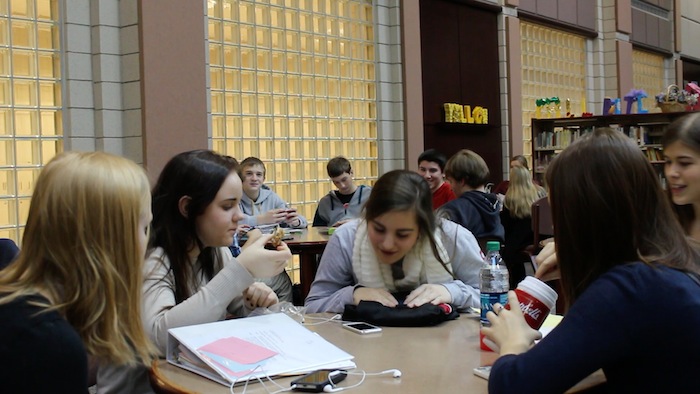The snowy week of January 12 started off the three days of final exams at Upper St. Clair High School. The smell of coffee and fear was in the air.
After a longer-than-usual winter break, well-rested students returned to school on January 5 for one last week of learning and studying before the next week’s finals. While some students began studying during break, others were just beginning.
The week before finals is known as the “cram” week. Both the library and the Resource Center are always crowded with students who are making flashcards and studying in groups.
Senior Brooke Ball says she “[…] used Quizlet links on Blended Schools and study guides […]” to help prepare.
Finals consisted of two subjects per day. The schedule was Social Studies and Science on Monday, English and Foreign Language on Tuesday, and Math and doubles on Wednesday. Doubles is for students who take two classes in the same department. Senior Eliza Luxbacher, for example, takes AP English and Creative Writing.
During the lunch mods, students went to their usual locations for mandatory quiet study.
At Upper St. Clair High School, most finals only count for 10% of the final grade. For students with a borderline grade, the final can dictate what the letter grade will be for the semester. Conveniently, there are websites that allow students to calculate the percentage needed on every final, allowing them to find the lowest score needed to receive an A or to maintain a B, C, etc.
These calculations may create a minor conflict: more and more students learn in order to pass the final; whereas, most teachers want their students to learn to understand the material.
Nonetheless, administration supports the idea of finals and its long-term help. Assistant Principal Christine Mussomeli shares, “We do feel that doing some type of large assessment does help in preparation of students for college. We know that some universities are moving away from finals and midterms, and they are putting into place more problem-based assessments; however, we do feel that the practice of studying and preparation does, in fact, help students be prepared.”
Administration has recently taken an interest in possibly making changes to finals in the future. Acting high school principal Dr. Angelo states, “What we’re trying to determine is what is the best way to assess you and when is the best time to assess you through those methods. So the traditional final that you’ve been exposed to is just one way to assess student knowledge, not necessarily the best or the worst.”
Despite how daunting finals can be, especially for freshmen, if students study a little bit every day leading up to the final, they should be well prepared to receive a good grade.
Assistant Principal Dan Beck reflects on finals as a whole, stating, “[…] I do think midterms ran as smoothly as they possibly could, there’s always a hiccup every once in a while, but even when that happens, […] teachers, students, RA’s, and our administrators work on it together […]”
After all the testing, though, students are just happy that finals are finally over.
